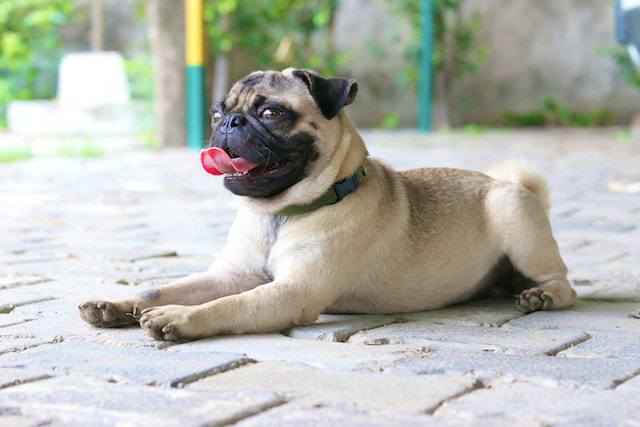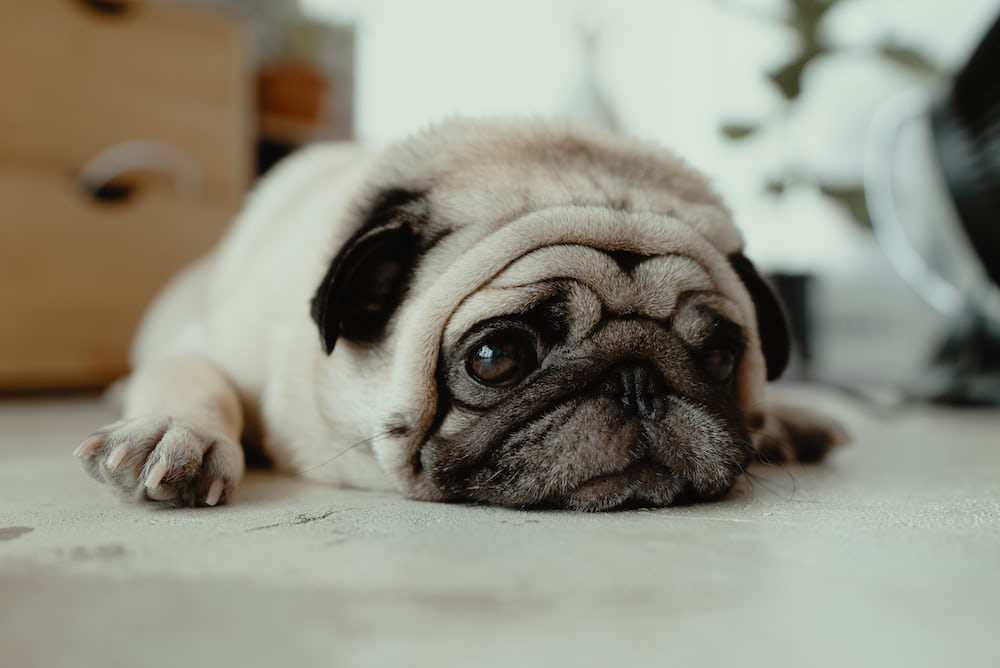9 Most Common Pug Stomach Problems

Let’s discuss pug stomach problems together…
Do you have a pug who seems to have a sensitive stomach, always experiencing digestive issues? Don’t worry, you’re not alone.
Pugs are well known for their adorable squishy faces and snorting sounds, but they can also be prone to certain health issues, including stomach problems.
In this post, we’ll take a closer look at some common pug stomach problems and what you can do to help your furry friend feel better and enjoy a happy, healthy life.
Symptoms of Stomach Problems in Pugs
Recognizing the symptoms of stomach problems in your pug is vital for early intervention and treatment. Common signs to watch out for include:
- Vomiting
- Diarrhea
- Loss of appetite
- Abdominal pain
- Bloating
- Changes in bowel movements such as hard stools
- Difficulty pushing out a bowel movement
- Constipation
If your pug displays any of these symptoms, it’s important to consult a veterinarian for a proper diagnosis.
Common Pug Stomach Problems

The following are some of the most common pug stomach problems you should know:
1. Gastric Dilatation-Volvulus (GDV)
GDV, also known as bloat, is a life-threatening condition that necessitates immediate medical attention. It happens when the stomach twists and traps gas and food inside.
Restlessness, abdominal pain, excessive drooling, and unproductive vomiting are all symptoms.
If you suspect your Pug has GDV, take them to the vet right away. Surgery is usually required to untwist the stomach and alleviate the problem.
2. Gastroenteritis
Gastroenteritis, or an upset stomach, can be caused by various factors such as dietary indiscretion, food allergies, or infections.
Symptoms include vomiting, diarrhea, and loss of appetite. To help your Pug recover, provide plenty of fresh water to prevent dehydration and feed a bland diet of boiled chicken and rice. If symptoms persist, consult your vet.
3. Gastroesophageal Reflux Disease (GERD)
GERD occurs when stomach acid flows backward into the esophagus, causing discomfort and irritation. Signs of GERD include regurgitation, excessive swallowing, and weight loss.
Elevating your Pug’s food and water bowls, feeding smaller meals throughout the day, and avoiding late-night feedings can help manage GERD. In severe cases, medication may be prescribed by your vet.
4. Pancreatitis
Pancreatitis is inflammation of the pancreas, which can be triggered by high-fat foods or certain medications.
Symptoms include vomiting, abdominal pain, loss of appetite, and lethargy.
Treatment involves fasting the dog initially and then transitioning to a low-fat diet. Your vet may also prescribe medications to ease symptoms and promote healing.
5. Inflammatory Bowel Disease (IBD)
IBD is a chronic condition characterized by inflammation in the gastrointestinal tract. It can cause symptoms like diarrhea, vomiting, and weight loss.
Managing IBD often involves dietary changes, such as feeding a hypoallergenic or limited-ingredient diet. Your vet may also recommend medications to control inflammation and provide relief.
6. Foreign Body Ingestion
Pugs are well-known for their inquisitive nature and proclivity to chew on things. Foreign object ingestion, such as toys or household items, can cause blockages in the digestive tract.
Vomiting, loss of appetite, and abdominal pain are among the symptoms.
Seek immediate veterinary attention if you suspect your Pug has ingested a foreign body. To remove the obstruction, surgery may be required.
7. Gastric Ulcers
Stress, certain medications, or infections can all cause gastric ulcers in Pugs. Vomiting blood, dark stools, and a loss of appetite are all possible symptoms.
Medications are typically used to reduce acid production and promote healing. To avoid irritation, your veterinarian may also recommend dietary changes.
8. Flatulence
The infamous Pug gas! While it may be amusing, excessive flatulence can indicate a serious problem. Dietary factors or food allergies are frequently to blame.
To reduce flatulence, feed a balanced diet to your Pug, avoid table scraps, and consider switching to high-quality, easily digestible dog food. If the problem persists, seek advice from your veterinarian.
9. Constipation
Constipation is a common problem in many dog breeds, including Pugs. It occurs when the fecal matter remains in the colon for too long, and becomes dry, hard, and difficult to pass.
As a result, a pug may have trouble defecating, may strain while trying to do so, and may produce small, hard, and dry feces.
Constipation can be caused by various reasons, including a lack of exercise, dehydration, a low-fiber diet, or certain health conditions such as spinal cord injuries, nerve damage, or infections.
To prevent constipation in Pugs, it is important to provide them with plenty of water, a high-fiber diet, regular exercise, and frequent potty breaks.
If your Pug experiences chronic or severe constipation, it is recommended to consult with a veterinarian for a proper diagnosis and treatment plan.
Learn more about the signs of a sick pug.
Causes of Pug Stomach Problems

Pugs are prone to gastrointestinal problems that can lead to stomach issues. There are various factors that can contribute to stomach problems in Pugs:
A. Dietary Factors: Poor quality or inappropriate diet can cause a variety of gastrointestinal problems, including stomach problems. Feeding pug table scraps or food that is too rich can lead to nausea, vomiting, and diarrhea.
B. Food Allergies: Pugs can develop allergies to certain foods that can cause gastrointestinal problems. Common food allergens for dogs include chicken, beef, dairy, and eggs. Allergic reactions can lead to vomiting, diarrhea, and other symptoms of stomach upset.
C. Stress and Anxiety: Pugs can be sensitive and prone to anxiety which can result in stomach problems. Stressful events like moving to a new home, loud noises, or changes in routine can trigger gastrointestinal issues for Pugs.
E. Parasites: Pugs can pick up parasites such as roundworms, hookworms, and giardia from contaminated food, water, or soil. These parasites can lead to stomach problems such as diarrhea, vomiting, and weight loss. Learn more about how deworming can cause diarrhea in dogs.
F. Infections: Pugs can suffer from bacterial or viral infections that can cause stomach problems. Common infections in Pugs include gastritis, gastroenteritis, and pancreatitis. These infections can cause symptoms like vomiting, diarrhea, abdominal pain, and loss of appetite.
Learn more about common health problems in pugs.
Diagnosing Pug Stomach Problems
When it comes to diagnosing stomach problems in pugs, veterinarians may perform various examinations and tests. These may include:
- Physical Examination: A thorough examination of your pug’s abdomen and overall condition.
- Blood and Urine Tests: These tests help identify any underlying issues or infections.
- Imaging Techniques: X-rays or ultrasounds can provide insights into the condition of the stomach and other abdominal organs.
Treatment Options for Pug Stomach Problems

Treatment for pug stomach problems depends on the specific condition and its severity. It may include:
- Dietary Changes: Switching to a special diet recommended by your veterinarian to alleviate digestive issues.
- Medications: Prescription medications can help manage symptoms and promote healing.
- Fluid Therapy: In cases of dehydration or severe vomiting, your pug may require fluids to restore hydration.
- Surgery: In severe cases such as bloat, emergency surgery may be necessary to correct the twisted stomach.
Preventing Stomach Problems in Pugs
Here are ways to prevent stomach problems in Pugs:
Proper Diet: Feeding your Pug a proper diet is the first step in preventing stomach problems. Pugs should have a balanced diet that includes all the necessary nutrients for their age, size, and level of activity. You should also avoid giving them table scraps or unhealthy treats as they can lead to digestive issues.
Feeding Schedule: Establishing a regular feeding schedule is crucial in preventing stomach problems in Pugs. Feed your Pug at the same time every day and make sure they have access to clean and fresh water at all times.
Avoid Overfeeding: Overfeeding your Pug can lead to obesity, which can cause digestive problems. Make sure to follow the recommended feeding guidelines and avoid giving your Pug too many treats.
Slow Feeding: Pugs are prone to overeating, and eating too fast can cause digestive problems. One way to prevent this is to use slow-feeding bowls that force your Pug to eat more slowly, reducing the risk of digestive issues. Learn more about why your pug refused to eat.
Avoid Exercise After Eating: Avoid exercising your Pug immediately after eating as it can cause digestive problems and even lead to bloat, which can be life-threatening.
Regular Exercise: Regular exercise is crucial in maintaining a healthy weight and preventing digestive issues in Pugs. Make sure to provide your Pug with regular exercise and playtime to keep them healthy and happy.
Avoid Table Scraps: Table scraps and human food can be difficult for Pugs to digest, leading to stomach problems. Avoid giving them table scraps and stick to a healthy and balanced diet.
Consult with a Veterinarian: Consult with a veterinarian to determine if your Pug is prone to stomach problems and what steps you can take to prevent them.
Regular Checkups: Regular check-ups with your veterinarian can help identify any potential health issues early on, including stomach problems, allowing for early intervention and prevention.
By following these tips, you can help prevent stomach problems in your Pug and ensure that they remain healthy and happy.
Learn more about dog stomach gurgling and not eating.
Related Questions
How can I tell if my pug is suffering from a stomach problem?
As a pug owner, you should be attentive to any changes in your dog’s behavior and appetite. Common signs of stomach problems include vomiting, diarrhea, abdominal pain, loss of appetite, lethargy, and excessive gas. If you notice any persistent symptoms, it’s best to consult a vet.
What should I do if my pug is experiencing stomach problems?
The first step is to ensure that your pug has access to plenty of clean water to prevent dehydration. You can also try feeding your pug small, frequent meals of easily digestible food such as boiled chicken and rice. If the symptoms worsen or persist for more than 24 hours, it’s crucial to consult a vet.
Can pugs develop food allergies?
Yes, pugs are prone to developing food allergies just like any other breed of dog. Common allergens include soy, corn, wheat, dairy, and beef. If you suspect that your pug has a food allergy, you should switch to a hypoallergenic diet and monitor their symptoms.
Can stomach problems in pugs be prevented?
While it’s impossible to prevent all stomach problems in pugs, there are some steps that you can take to reduce the risk. These include feeding your pug a high-quality, easily digestible diet, avoiding table scraps and fatty foods, and feeding your pug slowly using a puzzle feeder or a slow feeder bowl.
When should I take my pug to the vet for stomach problems?
If your pug is experiencing persistent or severe stomach problems, it’s best to consult a vet immediately. Additionally, if your pug has other symptoms such as lethargy, fever, or loss of appetite, a vet visit is necessary to rule out any serious underlying health issues.
Learn more about why dog guards their food and do not eat.
Conclusion
In conclusion, pugs may be cute and cuddly, but their stomachs can be quite a handful! From bloating to flatulence, these little pups can suffer from a variety of stomach issues.
However, with proper care and attention, you can help your pug avoid these problems and enjoy the best possible quality of life.
So, don’t let stomach problems stop your pug’s tail from wagging – with a bit of TLC, they’ll be back to snuggling and snoozing in no time!
